Занятие 49
Упражнение 1. Память.
На упражнение отводится до 10 минут, включая запоминание и ответы на вопросы.
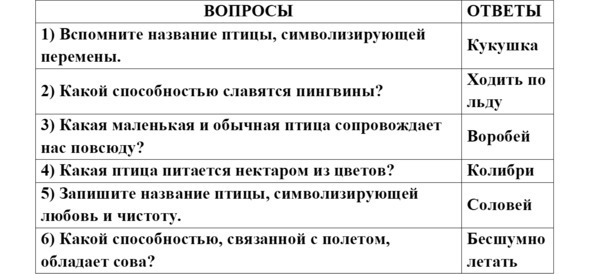
Упражнение 2. Внимание.
На подсчет затрачивается не более 2 минут.

Упражнение 3. Мышление.
Упражнение занимает в среднем 5—10 минут.
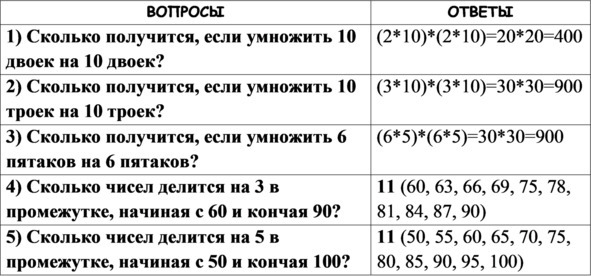
Упражнение 4. Речь.
В среднем выполнение упражнения занимает 5—10 минут. Ниже представлены слова для справок.
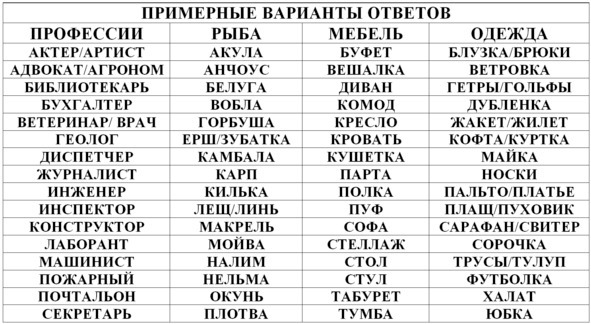
Упражнение 5. Моторика.
Копирование занимает 5—7 минут. Хорошим результатом считается точное воспроизведение образца с соблюдением границ фигуры.
Занятие 50
Упражнение 1. Память.
Задание рассчитано на 2 минуты. 1 минута на запоминание и 1 минута на раскрашивание.
Упражнение 2. Внимание.
На упражнение рекомендуется затратить не более 10 минут.
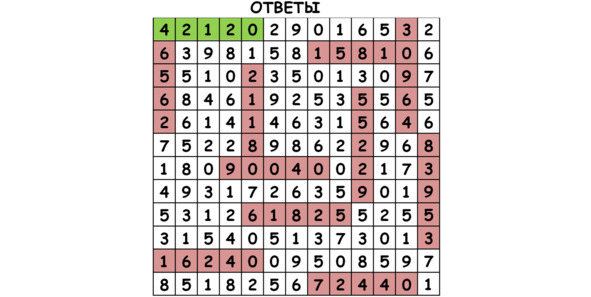
Упражнение 3. Мышление и речь.
На задание рекомендуется затратить не более 10—15 минут.
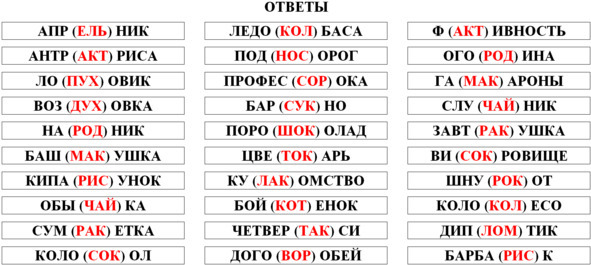
Упражнение 4. Моторика.
Выполнение рисунка по координатам занимает не более 10 минут. При внимательном закрашивании у Вас получится изображение птицы.
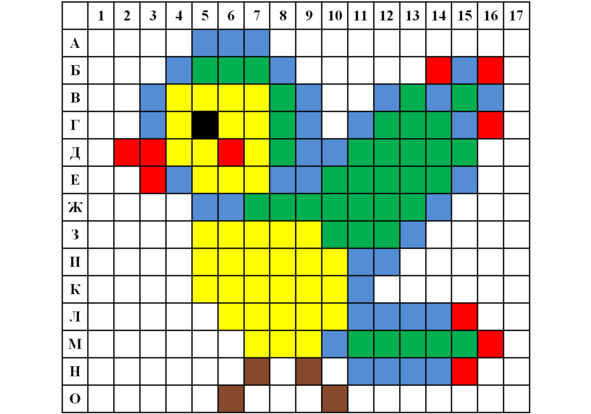
Список используемой литературы
1. Belleville S., Bherer L. Biomarkers of cognitive training effects in aging. Curr. Transl. Geriatr. Exp. Gerontol. Rep. 2012; 1 (2): 104—10.
2. Boripuntakul S., Kothan S., Methapatara P., Munkhetvit P., Sungkarat S. Short-Term Effects of Cognitive Training Program for Individuals with Amnestic Mild Cognitive Impairment: A Pilot Study, 2nd ed. Taylor & Francis, UK; 2012: 138—49.
3. Bherer L., Kramer A.F., Peterson M.S., Colcombe S., Erickson K., Becic E. Transfer effects in task-set cost and dual-task cost after dual-task training in older and younger adults: further evidence for cognitive plasticity in attentional control in late adulthood. Exp. Aging Res. 2008; 34 (3): 188—219. DOI: 10.1080/03610730802070068.
4. Bherer L. Cognitive plasticity in older adults: effects of cognitive training and physical exercise. Ann. NY Acad. Sci. 2015; 1337: 1—6. DOI: 10.1111/nyas.12682.
5. Brickman A.M., Siedlecki K.L., Stern Y. Cognitive and brain reserve. In: C.A. Depp, D.V. Jeste (eds). Successful Cognitive and Emotional Aging. American Psychiatric Publishing, Inc.; Arlington, USA; 2010: 157—72.
6. Colcombe S., Kramer A.F. Fitness effects on the cognitive function of older adults: a meta-analytic study. Psychol. Sci. 2003; 14 (2): 125—30
7. Da Cruz T.J., Sá S.P., Lindolpho M. da C., Caldas C.P. Cognitive stimulation for older people with Alzheimer’s disease performed by the caregiver. Rev. Bras. Enferm. 2015; 68 (3): 450—6, 510—6. DOI: 10.1590/0034—7167.2015680319i.
8. Gligoroska J. P., Manchevska S. The effect of physical activity on cognition – physiological mechanisms // Mater Sociomed. 2012; 24: 198—202.
9. Hamer M., Chida Y. Physical activity and risk of neurodegenerative disease: a systematic review of prospective evidence // Psychol Med. 2009; 39: 3—11.
10. Kawashima R. Mental exercises for cognitive function: clinical evidence. J. Prev. Med. Public Health. 2013; 46 (Suppl. 1): S22—7. DOI: 10.3961/jpmph.2013.46. S. S22.
11. Martin M., Clare L., Altgassen A.M., Cameron M.H., Zehnder F. Cognition-based interventions for healthy older people and people with mild cognitive impairment. Cochrane Database Syst. Rev. 2011; 1: CD006220. DOI: 10.1002/14651858.CD006220.pub2.
12. Paillard T., Rolland Y., de Souto Barreto P. Protective effects of physical exercise in Alzheimer’s disease and Parkinson’s disease: A Narrative Review // J Clin Neurol. 2015; 11 (3): 212—219. 12. Scarmeas N., Luchsinger J. A., Brickman A. M., Cosentino S., Schupf N., Xin-Tang M. et al. Physical activity and Alzheimer disease course // Am J Geriatr Psychiatry. 2011; 19: 471—481.
13. Palmer K., Wang H.X., Bäckman L., Winblad B., Fratiglioni L. Differential evolution of cognitive impairment in nondemented older persons: results from the Kungsholmen Project. Am. J. Psychiatry. 2002; 159 (3): 436—42.
14. Rodakowski J., Saghafi E., Butters M.A., Skidmore E.R. Non-pharmacological interventions for adults with mild cognitive impairment and early-stage dementia: an updated Scoping Review. Mol. Aspects Med. 2015 Jun. – Oct.: 1—16. DOI: 10.1016/j. mam.2015.06.003.
15. Schmidt W., Endres M., Dimeo F., Jungehulsing G.J. Train the vessel, gain the brain: physical activity and vessel function and the impact on stroke prevention and outcome in cerebrovascular disease. Cerebrovasc. Dis. 2013; 35 (4): 303—12. DOI: 10.1159/000347061.
16. Sitzer D.I., Twamley E.W., Jeste D.V. Cognitive training in Alzheimer’s disease: a meta-analysis of the literature. Acta Psychiatr. Scand. 2006; 114 (2): 75—90.
17. Wilson R.S., Scherr P.A., Schneider J.A., Tang Y., Bennett D.A. Relation of cognitive activity to risk of developing Alzheimer disease. Neurology. 2007; 69 (20): 1911—20.
18. World Health Organization. Global recommendations on physical activity for health. Guidelines approved by the guidelines review committee. Geneva: WHO; 2010.
19. Громова Дарья Олеговна, Науменко Анна Алексеевна, Преображенская Ирина Сергеевна КОГНИТИВНЫЙ ТРЕНИНГ И РЕАБИЛИТАЦИЯ ПАЦИЕНТОВ С КОГНИТИВНЫМИ НАРУШЕНИЯМИ // Доктор.Ру. 2017. №11 (140). URL: https://cyberleninka.ru/article/n/kognitivnyy-trening-i-reabilitatsiya-patsientov-s-kognitivnymi-narusheniyami (дата обращения: 29.08.2023).
20. Ильницкий А. Н. Раннее выявление и профилактика деменции у граждан пожилого возраста в практике учреждений социальной защиты / Ильницкий А. Н., Прощаев К. И., Оленская Т. Л. и др./ Методические рекомендации. – Белгород, 2017.
21. Третьякова Вера ВЛИЯНИЕ РАЗЛИЧНЫХ ВИДОВ ФИЗИЧЕСКОЙ АКТИВНОСТИ НА ЗДОРОВЬЕ МОЗГА И КОГНИТИВНЫЕ ФУНКЦИИ // Здоровье человека, теория и методика физической культуры и спорта. 2022. №4 (28). URL: https://cyberleninka.ru/article/n/vliyanie-razlichnyh-vidov-fizicheskoy-aktivnosti-na-zdorovie-mozga-i-kognitivnye-funktsii (дата обращения: 29.08.2023).

